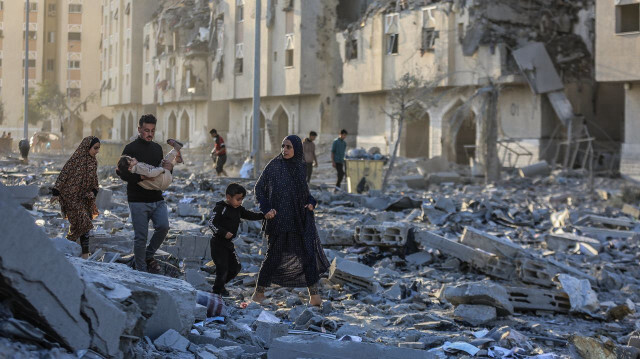
With much of Gaza's health care infrastructure in ruins due to relentless Israeli attacks, a Palestinian pharmacist has emerged as a beacon of hope for the displaced people in the southern Gazan city of Rafah.
Out of his makeshift “tent pharmacy,” Mohamed Arif al-Kilani is determined to provide much-needed medical assistance to the local population.
Over the past seven months, Israel's ground and air assault, coupled with a blockade on essential medical supplies and humanitarian aid, have decimated the Palestinian enclave's health infrastructure.
The dire situation has made it increasingly difficult for the tens of thousands of wounded Palestinians, who need access to life-saving care and medication.
Amid the chaos, the Gazans have fought resiliently and come to each other's aid and Al-Kilani is one such name.
Originally from northern Gaza's Beit Lahia, al-Kilani was displaced by the Israeli invasion, and like many others took shelter in Rafah.
Before the conflict started, his pharmacy had a wide range of medications available. However, after witnessing the acute shortage of drug and health care services in Rafah, al-Kilani took it upon himself to establish a pharmacy in a tent.
“In war, there is no central pharmacy, pharmaceutical companies, or warehouses,” he said. “Finding medicine has become so difficult that we go out early in the morning and look for them on the streets all day long. Sometimes, we ask people who used to have a pharmacy and have a stock.”
Explaining that chronic diseases pose a particular challenge, al-Kilani said: “We can hardly find medications for chronic diseases. Many Palestinians suffer from diabetes and hypertension, and they need to use medication regularly.”
“Patients who were using a specific drug before the war are now unable to find them. We have to provide them with alternatives.”
“As pharmacists, when we put patients on alternative medications, we need to monitor them for at least a week,” he added.
- Electricity shortage woes
Al-Kilani said that the persistent electricity shortage was another major challenge for them because certain medications require refrigeration.
“Electricity is crucial for pharmacies,” he said. “Without electricity, we cannot store medications that require special storage or a cold chain. We also need electricity to run nebulizers that treat respiratory diseases like asthma.”
He also stressed it was extremely difficult operating in an area under extreme temperature fluctuations with no air conditioning.
“Caring for children or newborns under such conditions in the pharmacy is very challenging. Administering injections or dressing wounds in such extreme temperatures also carries a high risk of complications,” said al-Kilani.
Israel has waged an unrelenting offensive on the Palestinian enclave since the Oct. 7 Hamas incursion last year killed some 1,200 people.
More than 34,500 Palestinians have since been killed, mostly women and children, and thousands of others injured amid mass destruction and severe shortages of necessities.
More than six months into the Israeli war, vast swathes of Gaza lay in ruins, pushing 85% of the enclave's population into internal displacement amid a crippling blockade of food, clean water, and medicine, according to the UN.
Israel also stands accused of genocide at the International Court of Justice, which has ordered Tel Aviv to ensure its forces do not commit acts of genocide and take measures to guarantee that humanitarian assistance is provided to civilians in Gaza.













